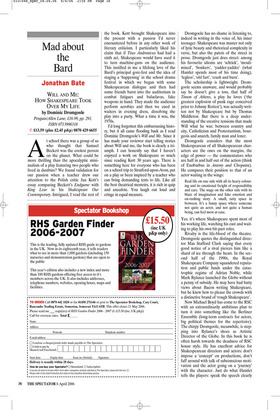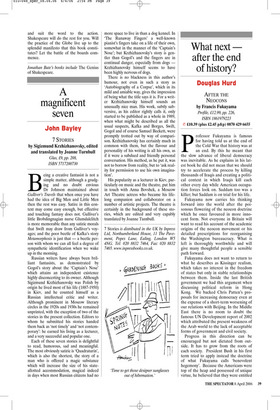Mad about the Bard
Jonathan Bate
WILL AND ME: HOW SHAKESPEARE TOOK OVER MY LIFE by Dominic Dromgoole Penguin/Allen Lane, £16.99, pp. 291, ISBN 0713998318 ✆ £13.59 (plus £2.45 p&p) 0870 429 6655 At school there was a group of us who thought that Samuel Beckett was the coolest person on the planet. What could be more thrilling than the apocalyptic minimalism of a play featuring two people who lived in dustbins? We found validation for our passion when a teacher drew our attention to the Polish critic Jan Kott’s essay comparing Beckett’s Endgame with King Lear in his Shakespeare Our Contemporary. Intrigued, I read the rest of the book. Kott brought Shakespeare into the present with a passion I’d never encountered before in any other work of literary criticism. I particularly liked his claim that if Titus Andronicus had had a sixth act, Shakespeare would have used it to turn machine-guns on the audience. This instilled in me a lifelong love of the Bard’s principal gore-fest and the idea of staging a ‘happening’ in the school drama festival in which we began with some Shakespearean dialogue and then had some friends burst into the auditorium in combat fatigues and balaclavas, fake weapons in hand. They made the audience perform aerobics and then we cued in waiters in evening dress, dissolving the play into a party. What a time it was, the 1970s.
I’d long forgotten this embarrassing history, but it all came flooding back as I read Dominic Dromgoole’s Will and Me. Since it has made your reviewer start telling stories about Will and me, the book is clearly a triumph. I can honestly say that I haven’t enjoyed a work on Shakespeare so much since reading Kott 30 years ago. There is something here for everyone who has been on a school trip to Stratford-upon-Avon, put on a play or been inspired by a teacher who can bring demanding texts to life. Like all the best theatrical memoirs, it is rich in quip and anecdote. You laugh out loud and cringe in equal measure. Dromgoole has no shame in listening to, indeed in writing in the voice of, his inner teenager. Shakespeare was master not only of lyric beauty and rhetorical complexity in verse, but also the patois of the street in prose. Dromgoole just does street: among his favourite idioms are ‘schtick’, ‘moulimixed’, ‘bonkers’, ‘yadder-yadder’ (what Hamlet spends most of his time doing), ‘legless’, ‘old fart’, ‘crash and burn’.
The scholarship is lightweight. Dromgoole seems unaware, and would probably say he doesn’t give a toss, that half of Timon of Athens, a play he loves (‘the greatest explosion of punk rage conceived prior to Johnny Rotten’), was actually written not by Shakespeare but by Thomas Middleton. But there is a deep understanding of the creative tensions that made Will what he was: between country and city, Catholicism and Protestantism, bourgeois and anarch, family man and loner.
Dromgoole considers that the most Shakespearean of all Shakespearean characters are the ones on the margins, the edge of power — the commentators who are half in and half out of the action (think of Enobarbus in Antony and Cleopatra). He compares their position to that of an actor waiting in the wings:
Real life on one side with all its heavy colouring and its emotional freight of responsibility and care. The stage on the other side with its blaze of imagination and fake emotion and on-rushing story. A small, tatty space in between. It’s a funny space where someone not quite an actor, and not quite a human being, can feel most at ease.
Yes: it’s where Shakespeare spent most of his working life, watching his cast and waiting to play his own bit-part roles.
Rivalry is the life-blood of the theatre. Dromgoole quotes the distinguished director Max Stafford Clark saying that every good notice of a rival pierces him like a shard of ice through the heart. In the second half of the 1990s, the Royal Shakespeare Company squandered reputation and public funds under the catastrophic regime of Adrian Noble, while Mark Rylance launched the Globe without a penny of subsidy. He may have had batty views about Bacon writing Shakespeare, but he knew how to please the crowds with a distinctive brand of ‘rough Shakespeare’.
Now Michael Boyd has come to the RSC with an extraordinarily ambitious plan to turn it into something like the Berliner Ensemble (long-term contracts for actors, big political themes for the repertoire). The chirpy Dromgoole, meanwhile, is stepping into Rylance’s shoes as Artistic Director of the Globe. In this book he is often harsh towards the deadness of RSC house style. He has excellent advice for Shakespearean directors and actors: don’t impose a ‘concept’ on productions, don’t faff around with talk of subconscious motivation and the actor going on a ‘journey’ with the character. Just do what Hamlet tells the players: speak the speech clearly and suit the word to the action. Shakespeare will do the rest for you. Will the practice of the Globe live up to the splendid manifesto that this book constitutes? Let the battle of the boards commence.
Jonathan Bate’s books include The Genius of Shakespeare.











































































 Previous page
Previous page